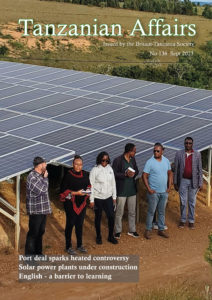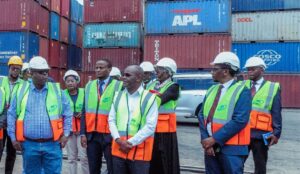by Ben Taylor
Government outlines five priorities for education sector in 2023/24
The minister for education, science and technology, Prof Adolf Mkenda, has outlined five priority areas for the education sector in the coming year. He was speaking in Parliament, presenting his ministry’s TSh 1.67 trillion (around £540 million) annual budget.
“The government will complete the review of the 2014 Education and Training Policy and the Education Curriculum and begin its implementation with the aim of strengthening knowledge and skills for graduates of all levels of education,” said Prof Mkenda.
The budget also aims to increase the opportunities and quality of technical training in secondary education and mid-level technical colleges, as this is seen as playing an important role job creation for young people. As part of this effort, the minister noted that the government will facilitate the renovation of technical secondary schools and provide them with learning and teaching equipment. The government will also expand training of vocational education teachers, establish 130 new vocational colleges and expand access to vocational education from 380,000 students each year to 680,000 students.
Thirdly, the government will develop the concept of industrial training (teaching factory), similar to apprenticeships. The idea is that this will enable students at every level to gain skills through practical experience that will be useful to them for either future formal employment or self-employment, explained the minister.
A fourth priority is to strengthen the country’s capacity in research, the use of science and technology and innovation to stimulate the growth of an industrial economy. In strengthening research, Prof Mkenda said, among other things, the government will conduct research in 177 areas, including education, science and technology, language, agriculture, business, fishing, livestock, medicine, human rights, people’s development, and communication. “The government will do this to increase knowledge and solve various challenges in society,” he explained.
Last but not least, the government also aims to increase the opportunities and quality of primary and secondary education as well as higher education.
Facing a combination of rapid population growth and high levels of unemployment, the ministry of education, science and technology has a vital but challenging role to play in taking the country forward. Critics have highlighted that between 2015 and 2023 the government has allocated, on average, 14% of the national budget to education, well below the 20% recommended standard for developing countries.
If the government were to meet this target, “it is clear that many challenges could be solved and the quality of education in the country could be raised,” said Dr John Kalage, executive director of HakiElimu, an education-focussed NGO.
Others pointed to a lack of joined-up thinking in the ministry. According to Ms Husna Sekiboko (Special Seats – CCM), employment was offered to around 29,000 new teachers this year, while more than 300,000 qualified teachers remained unemployed. (The Citizen)
Government to act “against immorality”
The government has said that it will take strict action against all those who are proven to encourage and engage in acts that violate the Tanzanian society’s moral code. Speaking in Parliament, the Prime Minister, Kassim Majaliwa stressed that the issue should not rest on the government’s shoulders alone but requires cooperation across the whole of society.
He was speaking in reference to the moral decay that has been discussed since The Citizen newspaper published an investigation into students’ behaviour in schools earlier this year. The paper’s investigation, focussed on two secondary schools in deprived neighbourhoods of Dar es Salaam, concluded that the causes of poor exam results were indiscipline and moral decay among students. In the report, students under the age of 18 were identified as engaging in prostitution and others in homosexuality.
“We have to protect our future generations against foreign cultures that endanger the well-being and development of the Tanzanian society,” said Mr Majaliwa. He added that the government has directed all schools to continue providing education to students from pre-primary to form six about the consequences of engaging in immoral behaviours.
“I strongly urge my fellow Tanzanians to work together to raise our voices so that we can put an end to immorality that has a big impact on our current and future generations,” he said.
He noted also that the law review commission has already reviewed some aspects of legislation, gathering opinions from various stakeholders to work on them, with the aim of identifying areas of weakness that contributed or provided loopholes for the spread of such practices. He said the government was involving all important stakeholders from the Mainland and the Zanzibar Islands.
Draft new education policy released
The Ministry of Education, Science and Technology has released the first draft of the proposed new edition of the education and training policy and curricular, which takes a competence- and skills-based approach.
The proposed new draft of the Education and Training policy describes the “formula” of education as “1+6+4+2/3+3+”. This stands for one year of pre-primary education, six years of primary education, four years of ordinary secondary education, two years of advanced secondary or three years of technical education and three years (or more) of tertiary or higher learning education.
The Minister for Education, Science and Technology, Professor Adolf Mkenda, said that the completion of these documents follows the promise of President Samia Suluhu Hassan she made in Parliament in 2021, saying that the government will review the education and training policy of 2014 and all curricula.
Minister Mkenda assured that the new draft matches with economic trends, including the 21st century technological needs in the world.
The draft, which was released on the ministry’s website, aims to establish a “vibrant, diverse and result-oriented policy and curricular”, and thus to increase the skills and competences of graduates in various fields in order to meet the demands of national and global jobs markets.
Moreover, the public will have a wide choice of enrolment options to ensure that the education offered provides life skills, vocational skills and creativity to match market demands.
The move according to the document, will give graduates a power of critical thinking, innovation, leadership and communication and information technology know-how, so that they can cope with challenges in the community and forge ahead.
The proposed new edition of the Education and Training policy will repeal the current education system of 2+7+4+2+3+, where a student graduates from higher learning after 18 years of learning. The new system has 16 years of learning up to graduate level, in line with countries like South Africa, Mauritius, Malaysia and Finland. (The UK generally has 17 years.)
With the proposed policy, the students will start primary education at six years, ideally after one year of pre-primary education that is intended to prepare the pupil to for formal schooling. The proposed system also provides room for those out of the education system to be enrolled in formal education according to set criteria, so that they can benefit from the opportunities in the formal sector. The government will have in place a national equivalent criteria and respective award for all levels of education. The draft policy also proposes that those in the compulsory education (primary and secondary) will keep on enjoying fee-free education.
In terms of curriculum, some of the proposed changes are to focus on competences in each subject.
For Standard One and Two pupils, the proposal of the curricular is to undertake the key subjects of reading, writing, basic English, mathematics, traditions upholding, arts and sports, environment and health.
Subjects for higher levels of primary schooling are Kiswahili, English, French, Chinese, Arabic, mathematics, history of Tanzania and ethical values, divinity, arts and sports, science, geography and the environment.
For the ordinary secondary education the subject list in the proposal are history of Tanzania and ethical values, history, geography, English, Literature in English, Kiswahili, Arabic, Chinese, French, sports, physics, biology, chemistry, mathematics, agriculture, additional mathematics, computer science and bookkeeping.
Others are business studies, textiles, fine art, music, theatre arts, home management, food and nutrition, bible knowledge, Islamic and Kiswahili literature.
The main fields for O-level vocational education include electrical engineering, mechanical engineering, civil engineering, automotive engineering, transport and logistics, clothing and textile, agriculture and food processing. Others are hospitality and tourism, commercial and business support services, printing, extraction and processing of minerals, cosmetology, creative arts, ICT and electronics and sports.
Minister Mkenda said the draft had been made available for the public to present their views before the final procedure to make the document official. (Daily News)
Call for improved menstrual hygiene facilities in schools
One in ten schoolgirls in Africa miss classes or drop out completely due to their period and substitute pads or tampons for less safe and less absorbent materials such as rags, newspaper or bark. This is according to a UNICEF report, cited by a Tanzanian NGO Urithi wangu (My Legacy) seeking solutions to the problem.
Running a three-day workshop to teachers from different parts of Dar es Salaam, who would in turn train their pupils on how to keep safe with washable pads, Urithi Wangu Programme Officer, Amina Ally said such skills being will help teachers to gain an understanding of the issues of water, sanitation and hygiene (WASH) including checking how the content can be incorporated into classroom teaching.
The UNICEF report points to three ways that girls and women are disadvantaged by challenges relating to menstrual hygiene. First, the lack of affordable sanitary products and facilities for girls and women keeps them at a disadvantage in terms of education when they are young and prevents their mobility and productivity as women.
Second, the lack of clean and healthy sanitation such as toilets and running water means that girls often do not have anywhere to change or dispose of pads safely and in privacy at school.
Third, the taboo nature of menstruation prevents girls and their communities from talking about and addressing the problem; raising awareness and education to eliminate the stigma of menstruation is a large part of the battle.
Urithi Wangu conducted a preliminary study to understand the actual situation of WASH services in Tanzanian schools. The results showed the importance of having a sustainable sanitation policy in schools that not only focuses on handling WASH services, but also barriers to access to safe menstrual equipment for adolescent girls. This includes findings that 29% of respondents said that pads and tampons are available at school, 59% reported that the toilets were not friendly and did not meet the needs of young girls and those with special needs, 50% said that their schools have special sections/rooms for girls to cover up during menstruation, and 75% said they did not have a safe disposal method for used pads. (Daily News)




